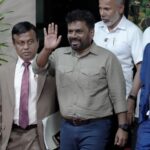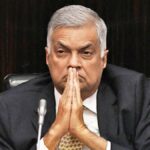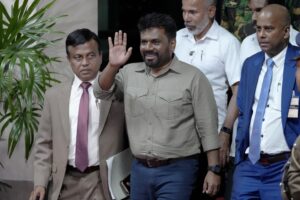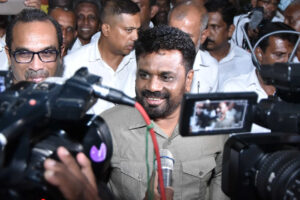As Sri Lanka gears up for the 2024 presidential elections, the political landscape is alive with a peculiar sort of buzz. The National People’s Power (NPP), formerly known as the Janatha Vimukthi Peramuna (JVP), is making waves with Anura Kumara Dissanayake (AKD) at the helm. The JVP, sporting a rebranded logo – the Compass – seems to have mastered the art of political chameleonism. But beware, dear voter, for while the façade may change, the essence remains troublingly the same.
Let’s first examine the heart of the matter – the economy. Sri Lanka’s economic woes are no secret. The island nation has been teetering on the brink, clutching at the lifelines thrown by the International Monetary Fund (IMF). Enter the JVP, with their grand declaration to cut all ties with the IMF. Sri Lanka is like a ship in turbulent waters, and the JVP requests the captain’s hat. However, their strategy of steering the ship is to sever all ropes to the lifeboats. That’s essentially the JVP’s economic plan.
It is no secret that the IMF has been a critical partner in stabilising Sri Lanka’s economy. By rejecting this support, the JVP is effectively charting a course toward economic isolation. The IMF’s role in providing financial assistance and policy guidance has been akin to a steady hand on the tiller. Without it, Sri Lanka risks drifting into uncharted and stormy economic seas, reminiscent of the chaotic policies of yesteryears.

Now, let’s turn our gaze to the recent past, specifically the Aragalaya movement of 2022. A movement that, at first glance, seemed a spontaneous uprising of the people. Dig a little deeper, and you find the JVP and its proxy groups like Peratugami (Front Line Socialist Party) and Anthare (Inter University Student Federation) pulling the strings. It was a masterclass in political puppetry, dressed up as a grassroots revolt.
The public, weary and frustrated, rallied behind the Aragalaya, seeing it as a beacon of hope. But what was painted as a people’s movement was, in reality, a strategic ploy by the JVP to harness the discontent and channel it towards their political ambitions. Slogans like “We are voting for the Compass this time” became the chorus of a carefully orchestrated campaign. It’s easy to whip up sentiment; it’s far harder to govern responsibly.
Like in the past where people were bought through liquor bottles and rice packets, the Aragalaya movement was fuelled by the JVP through mass funding that offered continuous supply of food, water, libraries, tents, medicine and entertainment to buy the people at GotaGoGama. Did Gotabaya fail as a president? Absolutely. Should Gotabaya have resigned? Absolutely. Should the people have realised the ploys of the JVP instead of being ignorant to the obvious? Absolutely – multiple things can be correct at the same time.
Even more telling are the JVP’s reactions to progressive initiatives. Take President Ranil Wickremesinghe’s meeting with Elon Musk to discuss bringing Starlink services to Sri Lanka – a move aimed at boosting internet accessibility and, by extension, the economy. The JVP’s Sunil Hadunetti decried this as opening doors to “economic hitmen” like Musk, George Soros, and James Packer. The irony here is almost poetic – the JVP, self-styled champions of the people, opposing a project that could genuinely uplift the nation’s infrastructure and economy. Their knee-jerk opposition to such initiatives exposes a fundamental misunderstanding of national development, or perhaps a wilful disregard for it. This wilful disregard is further evidenced when AKD and the JVP requested the Sri Lankan diaspora to not send any remittances to the country at a time when the country’s coffers were severely out of international currency to sustain supply chains. Most people seem to have forgotten these statements.
In their quest for power, the JVP has also turned their gaze outward, pandering to the Sri Lankan diaspora. “Come back and vote!”, they cry, attempting to create a trend among those who, while emotionally invested, are geographically and contextually removed from the immediate realities of life in Sri Lanka. JVP henchmen in foreign lands such as Ajith de Silva from the United States have been very vocal about asking the diaspora to visit the country to vote. It is a clever tactic, but one fraught with peril. The diaspora, swayed by nostalgia and idealism, might vote in a government whose policies could spell disaster for those living on the island. Isn’t this what the diaspora did in 2019? They swarmed into the country to vote for President Gotabaya and were a key support element in his campaign. We all know the end to that story. After bringing him to power, they left the country and returned to their lives in first world nations whilst those of us back home suffered.
The JVP has always had a knack for sensationalism, for creating a buzz that resonates with the disillusioned and the hopeful alike. Yet, sensationalism is a poor substitute for substance. The JVP’s history is a testament to this – a series of failed promises, violent insurrections, and a chronic inability to provide stable governance. Their current rebranding as the NPP and adoption of the Compass logo is a superficial change, a fresh coat of paint on a house with crumbling foundations.
Their economic strategies, or rather the glaring lack of them, highlight their fundamental inadequacy. Severing ties with the IMF isn’t just a risky gamble; it’s a recipe for disaster. The IMF, despite its controversial reputation, has been a lifeline for Sri Lanka, helping it stay afloat in the tempestuous sea of global finance. The JVP’s proposed economic policies are not just naive but dangerously detached from reality. It is akin to a student who, having barely passed high school, now wants to overhaul the education system. No pun intended.
Their approach to national development is similarly misguided. When President Wickremesinghe sought to introduce Starlink to enhance internet accessibility, the JVP’s knee-jerk reaction was to cry foul. They painted Elon Musk and other international entrepreneurs as economic hitmen, an accusation as baseless as it is inflammatory. This reaction is not just a reflection of their immaturity but also their inability to recognize genuine opportunities for progress. In a world that is rapidly moving towards digitalisation, opposing an initiative that could place Sri Lanka at the forefront of technological advancement is not just shortsighted; it’s regressive. Most of us remember the days of the Bandaranayake era whereby rations were the norm and the slow-paced under-developed economy was barely kept afloat. Most of us also remember the days of the JVP insurrections in the 70s and 80s that wrecked havoc on our motherland. The deaths, fears and abuse that came with it must never be repeated in the country.
Contemporary JVP propaganda argues that it has “moved” away from its “Leninist/Marxist ideology” to embrace a more liberal political stand. The JVP ideology evolved from Marxist-Leninism to Marxist-Leninism-Maoism. After Indian intervention in Sri Lanka in July 1987, determined to exploit the sentiment the JVP advocated an ultra-Sinhala nationalist or Deshapremi stand while retaining the Marxist-Leninist and Maoist framework. When the JVP killed, maimed and injured over a 100,000 civilians from 1987-1989, the core ideology of its rank and file was Marxist, Leninist and Maoist. Its targets included University of Colombo Vice Chancellor Stanly Wijesundara who was a respected academic of our university. The JVP also targeted the Dalada Maligawa, the most sacred Buddhist shrine, and also targeted over a hundred planters.
The Aragalaya movement, which saw widespread support due to the prevailing economic despair, was another example of the JVP’s strategic manipulation. The movement was presented as a spontaneous uprising of the people, but the JVP and its proxy groups were the puppet masters. They harnessed the public’s frustration, turning it into a tool for their political gain. It was a masterclass in political manipulation, wrapped in the guise of a people’s movement.
As the JVP, now the NPP, attempts to rebrand itself, it is crucial to remember the violent past they are trying to obscure. Their history is marred by brutal insurrections in 1971 and the late 1980s, where they resorted to terror to impose their vision of a communist state. Kumar Gunaratnam, a prominent figure in their proxy group Peratugami, was involved in numerous acts of violence, including the massacre of government forces in Trincomalee during the dark days of the late 80s. This violent history is not just a distant memory but a stark reminder of the lengths to which the JVP has gone – and might go again – in their quest for power.
Their rebranding efforts, including the adoption of a new name and logo, are a transparent attempt to distance themselves from this dark past. But changing a name and logo does not erase the memories of the bloodshed and chaos they caused. People like me are here to remember. It is a cynical ploy, hoping that the electorate has short memories or is too young to remember the horrors of those times. Like a wolf trying to pass off as a sheep by merely donning wool; the predatory nature remains unchanged.
In their bid to woo the diaspora, the JVP is attempting to create a wave of nostalgia and idealism among Sri Lankans living abroad. They urge the diaspora to return and vote, banking on the emotional ties to the homeland. However, this strategy is fraught with danger. The diaspora, while emotionally invested, might not fully grasp the ground realities and the potential consequences of their votes. The decisions made in the comfort of foreign lands could lead to dire outcomes for those living in Sri Lanka.
The JVP’s ability to create sensationalism is undeniable, but it’s a double-edged sword. Sensationalism can capture attention and create a following, but it’s a poor substitute for substance. The JVP has repeatedly shown that they excel in the former but fail miserably in the latter. Their history of violent insurrections, failed promises, and inability to provide stable governance is a testament to their unsuitability for leadership.
As Sri Lanka stands at a crossroads, the choice is stark. Electing the JVP is akin to inviting a perfect storm. Their economic naivety, their opportunistic manipulation of public sentiment, and their dark, violent past make them a perilous choice. Sri Lankans must look beyond the sensationalism, beyond the rebranding, and remember the true nature of the JVP.
The island nation needs leaders with a clear vision, viable strategies, and a genuine commitment to its well-being. The JVP has shown time and again that they are not those leaders. In a world where stability and progress are paramount, choosing a party with such a turbulent past and unproven future is a gamble that Sri Lanka cannot afford. The allure of change, while tempting, must be tempered with caution and a deep understanding of the potential consequences. The future of Sri Lanka depends on making informed, prudent choices – not falling for the siren song of a party with a history of chaos and a dearth of viable solutions.
Article written by Jude Seneviratne, a concerned citizen.















